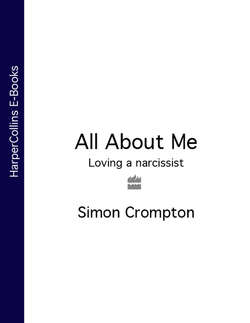Читать книгу All About Me: Loving a narcissist - Simon Crompton - Страница 5
1 IT’S ALL ABOUT ME What is a narcissist?
ОглавлениеEnough about me.
We’ve talked far too much about me,
let’s talk about you.
What do you think about me?
BETTE MIDLER TO HER LUNCH
COMPANION IN THE MOVIE BEACHES (1988)
So you want to know what a narcissist is? It’s all those annoying people who are more conscious of image than substance, isn’t it? Those hollow gym bunnies, those self-centred people who are so interested in how fabulous they are that they can’t even see how glorious you happen to be looking this evening? Possibly even someone like your boyfriend, or girlfriend?
Well, that’s certainly part of the story. Narcissism is a word that’s increasingly bandied around by the media as a means of describing intensely self-centred or image-conscious people. If you saw politician George Galloway’s preening, arrogant performance on Channel 4’s Celebrity Big Brother in 2006, it will come as no surprise that David Aaronovitch commented in The Times that ‘it was the narcissist, not the politician, who had turned up to compete’.1
Welsh rugby player Gavin Henson is another modern-day narcissist by popular definition. He was ‘outed’ by girlfriend Charlotte Church in July 2006 as having an extensive beauty regime, including constantly changing the side he sleeps on to avoid getting lines on his face. He’s reported as saying it takes him two hours to get ready before a rugby game. ‘Hot bath, shave my legs and face, moisturise, put fake tan on and do my hair. I need my fellow players to say I’m looking good.’2
You’ll have heard the term ‘narcissist’ being commonly bandied around as an alternative to the tag of ‘metrosexual’, applied to image-conscious celebs like David Beckham, Thierry Henry and even Tony Blair.3 This everyday use is all about image, self-obsession and vanity. Narcissists are just people who love themselves, aren’t they?
Well, not just that. There’s a far more specific meaning of the word narcissist, revolving around the way we live our lives and conduct our relationships. It has been used by generations of psychoanalysts to describe a specific form of human behaviour.
Here’s what a woman called Mandy thinks a narcissist is. She finished with her boyfriend after a two-year relationship. Then, on the internet, she saw accounts from other women who believed their relationships had foundered because their partners had ‘narcissistic personalities’ – not simply vain, but so self-centred that they were incapable of giving love and were only using their partner as a means to inflate their own ego. It rang so many bells for Mandy that it made her view her past relationship in a new light of understanding. This is what she says:
I really thought that I loved him. I thought that telling him I loved him and that I’d never leave him would somehow ease what I perceived to be his fear of abandonment. I put up with him never being loving and I believed him when he said that yelling at me was his way of showing me how much he loved me. He called it passion. When he was with other people, he was completely different. Everyone who met him said he was always singing my praises, saying how much he loved me.
Even now we’ve finished, he’s always in touch, promoting all the great things he’s done, and saying how fantastic he is. But now I get some satisfaction in knowing that he’s a narcissist – an empty shell who must constantly feed off others – and I’m well out of it. He isn’t capable of love. He’s a terrified chameleon who takes on the persona that will best please the person who’s feeding his ego at that particular moment.
It’s a powerful portrait, and illustrates the point that narcissism goes far beyond strutting like a peacock. Narcissistic people have a sense of self-importance that depends on the admiration of others – and often ends up damaging others because of the narcissist’s inability to understand how they feel. Their innate uncertainty about their own worth gives rise to them concocting a self-protective, but often totally spurious, aura of grandiosity. It may not always be as extreme as in Mandy’s description, but it is common.
This more worrying definition is very closely linked to the popular idea of narcissists as self-obsessed clothes horses. Here, at the beginning of the twenty-first century, a new and multifaceted understanding of the word is emerging, combining elements of previous interpretations down the decades. As the centuries have passed, new levels of meaning have stuck like barnacles to what originated as Greek myth. And as the idea of narcissism has gained increasing complexity, it also describes something very fundamental about human nature and the relationships we have with each other and our world. It is a concept that allows us to identify and characterise some of the defining aspects of personality.
